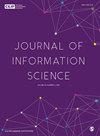巴基斯坦大学图书馆采用 Koha 作为图书馆管理系统的足迹
IF 1.7
4区 管理学
Q3 COMPUTER SCIENCE, INFORMATION SYSTEMS
引用次数: 0
摘要
本研究采用技术接受和使用统一理论(UTAUT)模型,调查了巴基斯坦大学图书馆采用 Koha 的情况。UTAUT模型认为,使用技术的决定受性能预期、努力预期、社会影响和便利条件的影响。该研究使用调查问卷收集了 250 名图书馆员的数据,并使用定量研究方法对结果进行了分析。研究结果表明,绩效预期、努力预期和便利条件对采用 Koha 的意愿有积极影响。有趣的是,社会影响对 Koha 的采用没有显著影响,这表明他人的意见在决定采用 Koha 的过程中没有发挥重要作用。个人创新性对图书馆员使用 Koha 的行为意向有负面影响。个人创新能力指的是个人采用新技术的意愿,这一结果表明,不太愿意采用新技术的图书馆员可能不太可能采用 Koha。研究还发现,巴基斯坦图书馆员对信息与传播技术(ICT)背景的重视程度较低。这可归因于对采用新信息技术(IT)解决方案的社会影响和有利条件认识不足。为了提高 Koha 在图书馆员中的使用率,研究建议图书馆提高社会影响力,为采用 Koha 提供更好的条件。本研究对图书馆管理者和政策制定者在大学图书馆推广使用开源图书馆管理系统(LMS)具有重要意义。本文章由计算机程序翻译,如有差异,请以英文原文为准。
The adoption footprints of Koha as a library management system in university libraries of Pakistan
The study investigated the adoption footprints of Koha in university libraries in Pakistan by using the Unified Theory of Acceptance and Use of Technology (UTAUT) model. The UTAUT model suggests that the decision to use technology is influenced by performance expectancy, effort expectancy, social influence and facilitating conditions. The study used a survey questionnaire to collect data from 250 librarians working in libraries and analysed the results using a quantitative research approach. The findings of the study revealed that performance expectancy, effort expectancy and facilitating conditions positively influenced the intention to adopt Koha. Interestingly, social influence had no significant effect on the adoption of Koha, indicating that the opinions of others did not play a significant role in the decision to adopt Koha. Personal innovativeness had a negative impact on the behavioural intention of librarians to use Koha. Personal innovativeness refers to the willingness of individuals to adopt new technology, and this finding suggests that librarians who are less willing to adopt new technology may be less probably to adopt Koha. The study also found that the significance of information and communication technology (ICT) background among librarians in Pakistan was low. This can be attributed to inadequate perceived social influence and facilitating conditions towards adopting new information technology (IT) solutions. To increase the use of Koha among librarians, the study recommends that libraries improve social influence and provide better conditions for adoption. This study has important implications for library managers and policymakers who are seeking to enhance the use of open-source library management system (LMS) in university libraries.
求助全文
通过发布文献求助,成功后即可免费获取论文全文。
去求助
来源期刊

Journal of Information Science
工程技术-计算机:信息系统
CiteScore
6.80
自引率
8.30%
发文量
121
审稿时长
4 months
期刊介绍:
The Journal of Information Science is a peer-reviewed international journal of high repute covering topics of interest to all those researching and working in the sciences of information and knowledge management. The Editors welcome material on any aspect of information science theory, policy, application or practice that will advance thinking in the field.
 求助内容:
求助内容: 应助结果提醒方式:
应助结果提醒方式:


